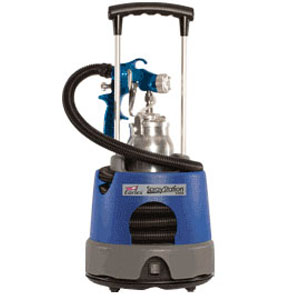Keeping It Safe When Spray Finishing

by Alan Noel
Professional Wood Finisher

When using spray finishing equipment such as the
Earlex Spray Station HV5500 Pro HVLP System
or
conventional spray guns, there are some very basic rules that must be followed when spray applying
finishes. The following guidelines will assist you in using this technology safely and effectively.
-
Spray equipment should only be used with a good source of adequate cross-ventilation (fresh air)
to keep fumes to an acceptable level for health and safety concerns. An appropriate personal
respirator, suitable to filter out the solvents in the finish, should be worn at all times.
-
When spraying solvent based products that contain lacquer thinner, acetone, denatured alcohol,
mineral spirits or similar solvents, there MUST NOT BE ANY SOURCES OF IGNITION in the immediate
area. (Water heater & furnace pilot lights, space heaters, electrical sparks from fans and other
motors, cigarettes, etc. could cause an explosion and/or fire).
-
Only "explosion proof" fans should be used when spraying finishes with flammable solvents. These
fans have completely enclosed motors with aluminum or some type of plastic/nylon fan blades.
Tube-axial fans are also designed for use when hazardous fumes are present. Most commercial spray
booths use these types of explosion-proof fans.
-
When spraying flammable finishes in a shop, all power sources must be in vapor proof conduit and
all lighting sources must be in vapor proof enclosures.
-
It is recommended that if you do not have commercial spray booth equipment and want to spray
finishes with flammable solvents, you spray outside where there are no combustion sources nearby and
where you have lots of fresh air available so fumes cannot become concentrated.
-
Water-based finishes are the safest to use around the home shop and the friendliest to spray apply
since they are not flammable. They can take a bit longer to dry than some solvent based finishes,
but are extremely popular with the home-based woodworker wanting to spray apply a finish on their
projects. Avoid extreme shop temperatures so they will dry and cure appropriately.
-
Lacquer and shellac based finishes are the most hazardous finishes to spray apply, but since they
dry very fast, they build a film quickly and are versatile in repairing some existing finishes.
-
 Mineral-spirit-based finishes like varnish are difficult to spray because of their very slow dry
times (dust and debris can settle in the finish as it dries and overspray remains tacky and sticky
for a long period), but with some patience and experience they can be sprayed successfully.
Mineral-spirit-based finishes like varnish are difficult to spray because of their very slow dry
times (dust and debris can settle in the finish as it dries and overspray remains tacky and sticky
for a long period), but with some patience and experience they can be sprayed successfully.
-
More detailed information can be found in Jeff Jewitt’s
Spray Finishing Made Easy
book and
companion DVD, which are available from Highland Woodworking.
Visiting Atlanta? Attend one of Alan's upcoming highly informative Highland Woodworking wood
finishing seminars:
French Polish Workshop
, December 14, 2011
Finishing the Finish
, December 21, 2011
Finishing the Finish
, January 18, 2012
French Polish Workshop
, January 25, 2012
Visit Highland Woodworking's Online
Wood Finishing Supplies Department
Alan can be reached directly via email c/o Alan Noel Furniture Refinishing at
anoelfurniturere@bellsouth.net
.
Return to
Wood News
front page

|
|
